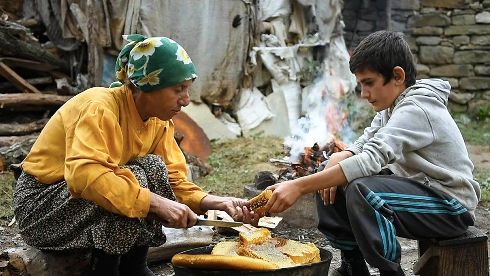
 The traditional way of beekeeping preserved by a Macedonian woman runs up against the modern motive for profit at all costs, in this gorgeous documentary.
The traditional way of beekeeping preserved by a Macedonian woman runs up against the modern motive for profit at all costs, in this gorgeous documentary.
It’s difficult for a documentary filmmaker to do justice to the practices of what you might call “traditional” people, that is, people whose customs and livelihood have persisted from a time before the modern era, for which the industrial revolution and the global market are just two aspects of the social transformation the world has experienced in the last two centuries. And that’s because modernity has affected everything, even those making an effort to preserve traditional ways. Honeyland, however, a film by Ljubomir Stefanov and Tamara Kotevska, comes pretty close to providing at least a glimpse of a way of life untouched by our time.
Honeyland introduces us to Hatidze Muratova, a woman in her 50s who harvests honey from her own beehives in the mountains of Macedonia. We see her climb to a beehive that is hidden behind a large rock. She removes the covering and, with her bare hands, pulls honey-covered frames out of the hive while chanting to the bees and using smoke to keep them from getting agitated. She doesn’t take all of the honey, only part of it, saying “Half for you, half for me.”
Hatidze lives in a hut with her bedridden mother, who is in her 80s, sick and partially blind. She takes care of her mother, and a cat, and a dog. The little profit she makes for her honey supports them. We see her make the four hour trip to the nearest city, the capital, Skopje where she haggles in the market for the most she can charge for her product, which has a flavor far richer than any honey you can get from commercial hives. She and her mother without electricity or running water, and with only an oil lamp to illuminate their hut at night.
The film has no narration or interviews, so some of these details I had to glean after I saw it. I couldn’t help but wonder how the filmmakers established such a sense of intimacy with their subject. Everything we see appears raw and unrehearsed, with little evidence of any awareness of the filmmakers’ presence. This seemed hard to believe until I discovered that Stefanov and Kotevska spent three years with their subject, recording hundreds of hours of footage. Hatidze wanted her methods, which some have called “wild beekeeping,” to be widely known, so that perhaps the tradition can be preserved by other people seeing the film. And the first part of the movie details just that, but as chance had it, further events made this all even more relevant.
A family in a motor home suddenly moves in right nearby. They are nomadic cattle herders—father, mother, seven kids, and a fairly large herd of cows, about fifty head. They speak in the same dialect as Hatidze. Although they are loud, the father acts somewhat abusive to his children, and, as it turns out, they are incompetent cattle herders as well, Hatidze—who is the soul of kindness—makes friends with them, and even bonds with one of their kids, a pre-adolescent boy. But then the father, noticing Hatidze’s skill with bees, decides to imitate her, and buys some hives to set up his own honey business. He tries to use the same methods, but he doesn’t have her gentle touch. She warns him to leave half the honey for the bees, or else they will starve and invade the other hives. But he makes a deal with an outside merchant that requires him to produce more honey than is sustainable. Hatidze can see disaster looming, but she can do nothing to stop it.
The family is not evil; they are just people trying to survive in a competitive economic climate. That’s one way that the documentary differs from what you’d probably see in a fiction film. It makes the situation more urgent, and more poignant. In this little corner of the world we witness, replayed in miniature, the struggle between indigenous traditional societies and the large economic forces that seek only to exploit the earth, not to nurture it. This correspondence between a real current situation and a symbolic significance for all of us, is a rare thing to encounter. On top of that, the film is stunningly beautiful. Honeyland is a film of truth, and a challenge for the mind and heart.

